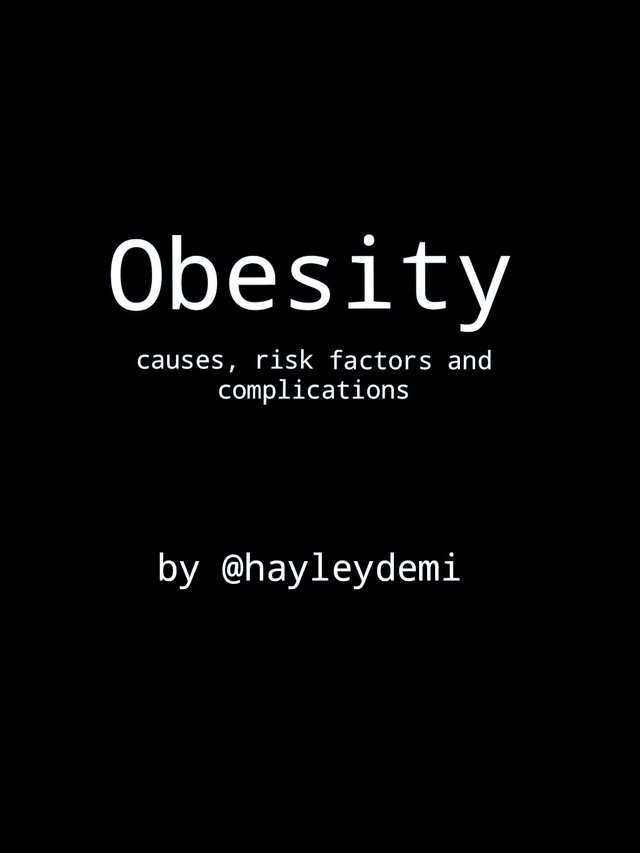Obesity: causes, risk factors and complications by @hayleydemi

In Obesity, a person has excessive fat in the body.
An adult is obese when the person has a BMI of 30 or higher.
Body mass index (BMI) is a formula that computes an individual's height and weight to determine their body size.
Obesity raises the risk of developing major conditions such heart disease, cancer, diabetes(type 2)
Obesity is a widespread condition.
BMI isn't everything, though. It has its shortcomings as a measure.
Obesity can develop over time if you consume more amounts calories than you expend via regular exercise and everyday activities. These excess calories accumulate over time and lead to gain in weight
However, it's not usually just about how many calories you consume and expend or how active you are. Although those are real causes of obesity, some of them are out of your control.
Causes of obesity
The following can cause obesity:
Genetics: This could have an impact on how your body converts the food you take into energy as well as how it stores fat.
Ageing: It could result in reduced muscle mass and a slow metabolism, making it simpler to gain weight.
Not getting enough sleep: This might result in hormonal changes that increase hunger and food cravings for specific high-calorie items.
Pregnancy: Weight acquired during this time may be challenging to reduce and may ultimately result in obesity.
Obesity can also be caused by some medical disorders. These consist of:
A disorder known as polycystic ovarian syndrome (PCOS) that results in an unequal amount of the reproductive hormones of females.
Prader-Willi syndrome: An uncommon congenital condition that results in increased appetite.
High amounts of cortisol (the stress hormone) in the body can result in Cushing syndrome.
Hypothyroidism: When the thyroid gland produces insufficient amounts of a number of critical hormones.
Osteoarthritis (OA) and other painful disorders that might cause activity reduction
Risk factors
Genetics: Some individuals are genetically predisposed to struggle with weight loss.
Environment: Your family, school, and community environments can all have an impact on how much and what you eat, as well as how active you are.
The following might make you more vulnerable to developing obesity:
live in an area with few options for healthy eating or with many options for high-calorie meals, such as fast-food restaurants,
haven't mastered making nutritious meals yet,
believe you cannot afford to buy healthy foods,
haven't discovered a suitable location in your area to play, walk, or workout
Taking medications like birth control pills or steroids can increase your risk of gaining weight.
Diagnosis
BMI can be used to check for obesity.
Additional, more precise methods of calculating body fat and body fat distribution include:
testing for skinfold thickness
comparisons of hips to waist
screening procedures such MRIs and CT scans.
In order to diagnose the health concerns associated with obesity, the following tests might also be recommend:
blood tests to measure levels of glucose and cholesterol
testing for liver function
a diabetes examination
thyroid exams
heart examinations like an electrocardiogram.
Your risk for obesity-related diseases can also be accurately predicted by measuring the amount of fat around your waist.
Complications
The effects of obesity extend beyond simply weight gain.
Your bones and internal organs are put under stress when your body fat to muscle ratio is excessive.
Additionally, it heightens the body's inflammatory response, which is known to be a cancer risk factor. A significant risk factor for diabetes type 2 is obesity.
Numerous health issues, some of which can be fatal if untreated, have been connected to obesity:
diabetes type 2
heart condition,
elevated blood pressure
specific cancers (breast, colon, and endometrial),
stroke, a gallbladder condition, fatty liver disease,
elevated cholesterol, arthritis, infertility.
Treatment
You can get Medical help if you have obesity and have not been able to lose weight by yourself. Your doctor might recommend you to a weight expert
You may have to work with your doctor to achieve weight loss. The team may consist of a dietician and a therapist.
You can be assisted by your doctor in making the needed lifestyle changes. Occasionally, they might prescribe drugs or surgery for weight loss.
Thank you for contributing to #LearnWithSteem theme. This post has been upvoted by @Reminiscence01 using @steemcurator09 account. We encourage you to keep publishing quality and original content in the Steemit ecosystem to earn support for your content.
Regards,
Team #Sevengers
Congratulations, your post has been supported by @steem4nigeria. This is the official community account of Nigerians on Steemit. You can reach us here on our community account.
Discord Facebook Twitter
Thank you very much @hayleydemi for this very detailed post of yours.
You have explained what obesity is and the contribution that calories have to one's obesity.
I use to feel that too much sleep causes obesity too but I'm shocked to see that you said lack of sleep causes obesity, well I will have to carry out my own research on it.
I have a question too, although I am a slim person by nature and I want to become a little bit fat, please do you have any recommendations for me 😃.
Thanks again for this detailed post
Eat healthy and work out to gain muscle mass. That should work.